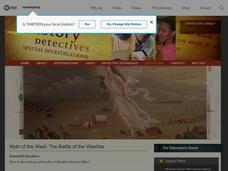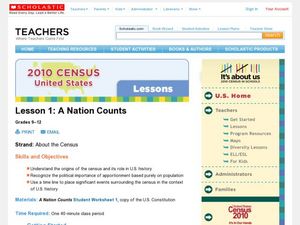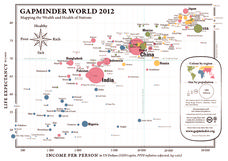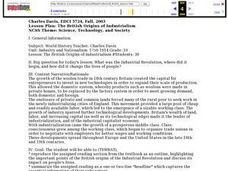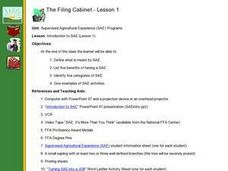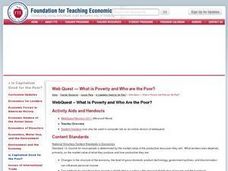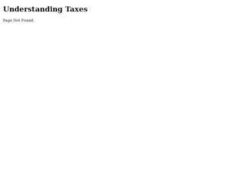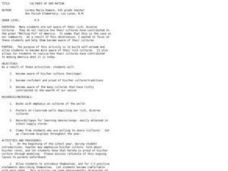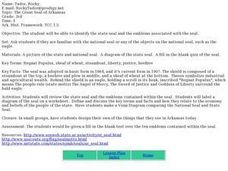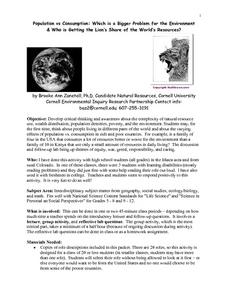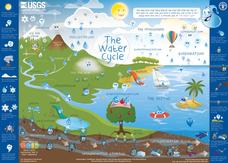PBS
Myth of the West: The Battle of the Washita
Go West, young man! Scholars use PBS video clips, slide shows, and interactive materials to create a picture of Manifest Destiny in the American West. Using a variety of primary and secondary sources, young historians learn about the...
Curated OER
Non-Western Economic Values
Students engage in a game of economic exchange that present a variety of perspectives on wealth. They read scenarios and write a journal response to the scenario. They discuss how we use money in the Western culture and discuss how...
Curated OER
A Nation Counts
High schoolers explore the functions of the U.S. Census. In this civics lesson plan, students understand the origins of the census and its role in U.S. history, recognize the political importance of apportionment based purely on...
Curated OER
Gapminder World 2012
Here is a very interesting infographic that compares the average life expectancies, per capita incomes, and population sizes of every country in the world in 2012.
Columbus City Schools
Poetry Speaking and Listening Standards
Celebrate April's National Poetry Month or enrich a poetry unit with a wealth of language arts material. Class members develop an oral interpretation of a poem and/or develop a podcast interview with a poet.
Curated OER
Specialization and Voluntary Exchange
Studnets participate in a trading simulation game in which they experience the effects of trade and how trade can increase wealth.
Curated OER
Globalization
Students explain the various perspectives on globalization, and the sweeping political, economic, and cultural changes that are taking place as a result of the increasing connections between people of different nations of the world.
Curated OER
The British Origins of Industrialism
Tenth graders brainstorm the Industrial Revolution and how it changed the lives of people. They describe rural life in preindustrial Britain. They identify the factors that allowed Britian to become the first industrialized nations.
Curated OER
The Filing Cabinet - Lesson 1
Students explore and define what is meant by Supervised Agricultural Experience is and list five benefits of having it. They identify five categories of Supervised Agricultural Experience and supply a wealth of examples. Each student...
Curated OER
WebQuest- What is Poverty and Who Are the Poor?
High schoolers are introduced to a variety of easily accessible data about poverty. The search activity performs double-duty in exposing students to the nature and magnitude of world poverty and in confronting them with different types...
Curated OER
The Wealth Tax of 1935 and the Victory Tax of 1942
Students explain that during the Great Depression and World War II, the Roosevelt administration implemented new, broader, and more progressive taxes in order to cover the costs of the New Deal programs and the war.
Curated OER
Placing Deerfield in a National Context
Eleventh graders understand that world events brought important changes that impacted Deerfield. Students use information gained from this and other periods to develop a continuum showing the growth of the Deerfield community.
Curated OER
The International Monetary Fund, The World Bank, and the World Trade Organization: A Help or Hindrance to Developing Countries?
Eleventh graders study the International Monetary Fund, World Bank, and World Trade Organization. They collaborate in small groups to research and explore perspectives of each group, identify objectives of each group and key arguments...
Curated OER
Cultures of Our Nation
Young scholars bring in family items that represent their culture and present them to the class. In this culture lesson plan, students can bring in food, music, dance, pictures, and more.
K12 Reader
Summarize It: President Theodore Roosevelt's 7th Annual Message to Congress
How did Theodore Roosevelt stress the importance of conservation during his time as president of the United States? Take a closer look at the language Roosevelt used himself in a 1907 address to Congress, and have your young...
University of California
Roots of the Cold War
When and how did the Cold War begin? To answer this question, you will not find a better-organized, in-depth, activity- and inquiry-based resource than this! Executing best teaching practices throughout, each portion of this inquiry...
Curated OER
Great Seal of Arkansas
Students identify the state seal of Arkansas and the emblems associated with the seal. They use a Venn diagram to compare the national seal with the state seal.
Curated OER
World Consumption: Unequal Slices of the Pie
Students interpret the United Nations Human Development Reports and explain the relevance and use of the human development index in offering insight into a nation and its challenges. They draft a letter to the United Nations.
Curated OER
The Energy Grab Game
Eighth graders explore the scarcity of energy resources. They also explore the competition for natural resources and the inadequate distribution of natural wealth among the Earth's nations.
Curated OER
Population Vs Consumption: Which is a Bigger Problem for the Environment & Who is Getting the Lion's Share of the World's Resources?
Students develop critical thinking and awareness about the complexity of natural resource use, wealth distribution, population densities, poverty, and the environment. They think about people living in different parts of the world and...
Curated OER
Art and Culture of Germany
Germany is a country with a rich and interesting history that can provide a wealth of teaching opportunities.
Curated OER
Exploring the Water Cycle
The water cycle is one of earth's most easily observable processes, but demonstrating each step within classroom walls can be a challenge. Through a series of videos and quick demonstrations, cover each aspect of the hydrologic cycle in...
Practical Action
Climate Change - Who's In Control?
How can both individuals and governments respond to climate change and take responsibility to reduce its effects on our environment? Here you will find three lessons filled with discussion, debate, and role-playing...
US Geological Survey
Water Cycle Poster
How many parts make up the water cycle? How many things on Earth rely on water as a system? Learn more about the water cycle in an informative and colorful poster. Print and hang, or project the graphic in the classroom for optimal use.


